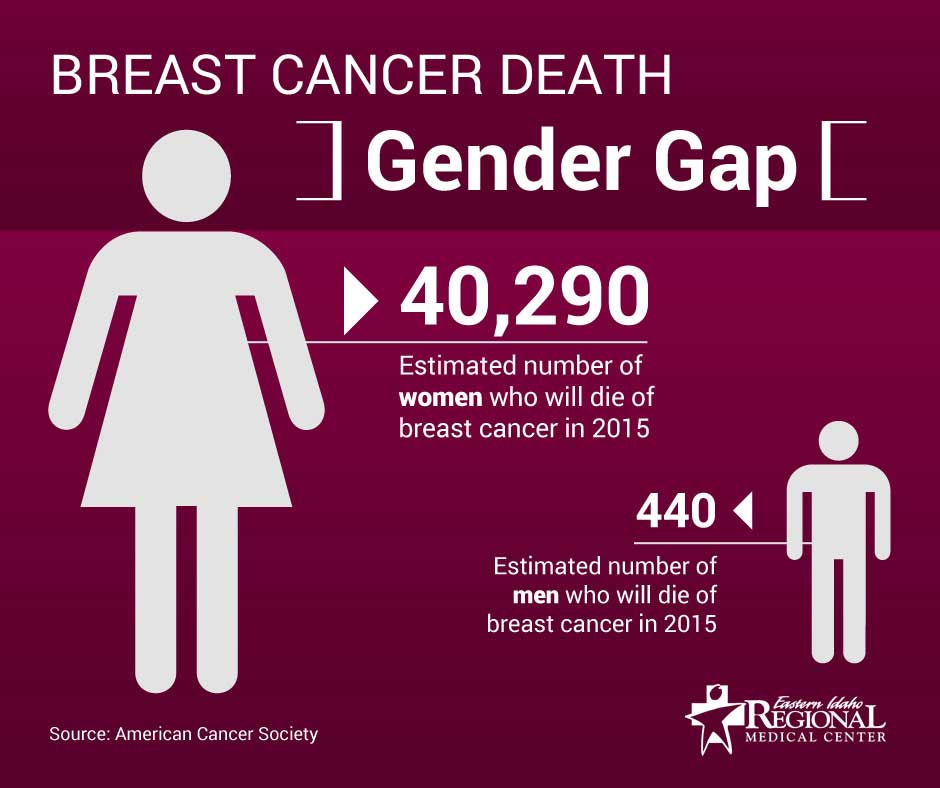Breast cancer may largely be seen as a woman's disease. While we're used to campaigns about breast cancer featuring women, these campaigns miss another segment stricken with this disease: men.
Breast cancer in men is significantly less common. The lifetime risk of getting breast cancer for men is about 1 in 1,000, according to the American Cancer Society (ACS).
Like women, breast cancer in men usually shows up as a lump under the skin. Other symptoms can include fluid discharge, red or scaly skin, or dimpled or puckered skin, according to the National Library of Medicine.

Source: American Cancer Society (1, 2)
Although breast cancer is rare in men, it's still devastating. And those battling it face a different experience than women do. Here are some of the ways men may grapple with breast cancer differently.
Men Have Different Risk Factors.
Many risk factors for breast cancer remain the same for men and women, such as smoking and being overweight.
Men, however, have some other things to watch out for, according to the ACS:
- Klinefelter's Syndrome: Most men have two X chromosomes. Men with Klinefelter's Syndrome have two X chromosomes and one Y chromosome. They generally have smaller testicles, less testosterone, more estrogen, and can be infertile. It's estimated that they have a 1% chance of developing breast cancer (as opposed to 0.001% in other men).
- Estrogen treatment: Men who have been treated with estrogen”for prostate cancer, for example”have a higher chance of getting breast cancer.
- Their jobs: Some male-dominated occupations, such as steel mills and work around gasoline fumes, may contribute to breast cancer. This may be a result of exposure to high temperatures, harming testicles and hormone levels.
Men May Delay Testing.
For both men and women, early detection means a better prognosis. Messaging from breast cancer campaigns to physicians all strongly encourage women to seek help if they suspect there is a problem.
However, with no messaging directed at men, they're often at a loss for what to do. Often embarrassed about a change in their breast tissue or a growing lump, men may put off seeing a treatment provider, according to the Susan G. Komen organization.
This may also contribute to why men carry a slightly higher mortality for breast cancer than women, says the National Breast Cancer Foundation.
Men May Need Encouragement To Get Help.
The stress of dealing with a breast cancer diagnosis can lead to depression, warns the National Institute of Mental Health (NIMH). This is difficult for anyone, but it presents unique challenges to men.
Men are more likely to suppress emotions due to social stigma, says the National Alliance for Mental Health. They are also more likely to keep feelings of depression to themselves for fear of appearing weak, according to the National Alliance on Mental Illness.
This is not an insignificant problem. With no outlet to express negative feelings, men can turn to substance abuse and even thoughts of suicide. This is particularly worrisome as men are more likely than women to commit suicide, reports the NIMH.
There are many effective treatments for depression, including multiple types of therapy and medication, advises the NIMH.
If you or a man you care about is diagnosed with breast cancer, be on the lookout for signs of depression, and be supportive of their emotions. Encourage them to get help if negative feelings intensify.
If you suspect you have breast cancer, contact Eastern Idaho Regional Medical Center's Cancer Center for emotional and physical support.
$webqFacilityNumber
Need a Physician?